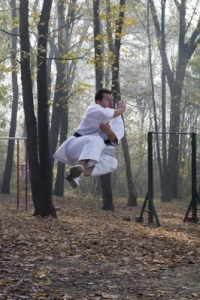Starting a new story is one of the best feelings you can have. It’s that wonderful moment before your insecurities and paranoia kick in and tear your creativity apart from within.
It’s also exciting not knowing where your characters are headed – at least, not finally. You may have some idea. But it’s not set in stone.
The scene is being set, the characters introduce themselves, and the world you have crafted launches into the imaginations of the reader on it’s maiden voyage. You cast them off into the abyss of your mind, the rough seas of your passions and noticings, and the wonderment you’ve constructed out of your skills with craft and narrative.
However, a poorly written introduction can quickly alienate a reader. It’s much easier to quit a book on page 1 than it is on page 100. As Kurt Vonnegut famously said:
“Use the time of a total stranger in such a way that he or she will not feel the time was wasted.“
No siree. This is very important. Reading is a commitment. It could take a few hours to read, or a few months. Either way, it’s going to be valuable time to someone. Cherish it, and respect it.
So, below are some tips to help craft a strong story introduction.
Of course, these should be taken as a guide, as you can’t use all of them at once. There is no definitive way to craft a perfect introduction, as you can’t please everyone. But, with a bit of thought and a lot for practice, utilising some of these will help push your story to the next level.
Get Straight To It
“As my cab pulled off FDR Drive, somewhere in the early Hundreds, a low-slung Tomahawk full of black guys came sharking out of lane and sloped in fast right across our bows.”
Money by Martin Amis
Get stuck in. Right away. Don’t worry about building up to something. If anything, get to the thing then build backwards. The mystery of being thrust into the action is much more compelling than “so he woke up and stretched. ‘Yawn’ he said, then made his way to the bathroom to blah, and blah, and blaaaahhh”.
Much better: “The gun went off. That sound of metal exploding, cracking the air like lightning, shook him. He’d never imagined he’d be shot.”
The longer you linger, the more of your precious words are wasted away and lost forever. Trust your reader, and reward them for taking the time to check you out. Jump in two footed, and go from there…
That Said, Don’t Rush Ahead
Obviously you don’t want to chuck them into a situation that will need certain aspects established. If you start off with something too confusing, it will be a struggle for the reader to invest in the story. If it’s too confusing, you may lose your reader.
That’s not to say you can’t leave breadcrumbs in your opening that will make more sense upon reading further, but a good opening will contain both elements for now, and elements for later.
Draw the Reader In
“If you’re reading this on a screen, f**k off. I’ll only talk if I’m gripped with both hands.” Joshua Cohen, Book of Numbers.
Yeah, so you don’t have to be as aggressive as the above example, but the point I’m trying to get across is that you want your reader to stand up and pay attention. One way of doing that is to engage with them directly, so long as it fits with the theme of your story.
For example, if you choose the above style of introduction, don’t then segue into a world of daisies and polka dots. It will feel forced and inappropriate, and the reader will likely feel alienated and confused. But if your character, or the tone of your story warrants it, there is no problem at all with using a little bit of fire and fury.
Of course, you don’t have to be rude. you could relate to the reader, or buddy up to them, or even flirt with them. Let the narrator’s voice gudie you.
Introduce Your Hero
“If you really want to hear about it, the first thing you’ll probably want to know is where I was born, and what my lousy childhood was like, and how my parents were occupied and all before they had me, and all that David Copperfield kind of crap, but I don’t feel like going into it, if you want to know the truth.” — J. D. Salinger, The Catcher in the Rye
The above intro is a great example of a hero introducing themselves, and giving you plenty of evidence of their character. We all know that Holden Caulfield is a sour lad. We know this because from the very first sentence he utters, he sets himself up as thus.
Your audience want to know who to root for, and know why. If you introduce a character who isn’t very compelling, or don’t give them someone to cheer for, chances are you’ll lose the interest of a reader.
Create a Mini-Mystery
“It was a bright cold day in April, and the clocks were striking thirteen.” George Orwell, 1984.
Unless you live under a rock (and apologies if you do), you should be well aware of the dystopian bleakness portrayed in George Orwell’s (arguably) most famous work, 1984. This opening line establishes right from the get go just how surreal this alternative future is, and the mystery of something we know so well being changed in this way creates all kinds of questions: Why not o’clock? Thirteen, like, bad luck thirteen? What time is thirteen? Is the day still the same length? How would this work with the Gregorian calendar? Does it? Why is there an extra hour in the day?
And it is these kinds of questions, often raised by a sense of unease, that can keep us reading on.
Set the Scene
“There was a desert wind blowing that night. It was one of those hot dry Santa Anas that come down through the mountain passes and curl your hair and make your nerves jump and your skin itch. On nights like that every booze party ends in a fight. Meek little wives feel the edge of the carving knife and study their husbands’ necks. Anything can happen. You can even get a full glass of beer at a cocktail lounge.” — Raymond Chandler, Red Wind
This is one of my favourite opening paragraphs in all of literature. Raymond Chandler has a very distinct style, and was well regarded for his gritty tomes set in a crime-riddled LA. This establishes that world perfectly, giving you not only the place but the mood, the people, the atmosphere, and even the opinion of the narrator about all of these things.
See, a setting can be just as important as a character. Some would even argue that the setting is a kind of glorified character in its own right.
Murder Mundanity
“All this happened, more or less.” Kurt Vonnegut, Slaughterhouse Five.
In the above quote from Mr Vonnegut, we are confronted with the fact the upcoming narrative is probably going to be unreliable. Those that have read the story will know that as the story progresses, this unreliability is what lends so much charm to the overall tale, and this in itself represents Vonnegut’s own ideas about the ridiculous and unreliable nature of wars, and the men who fight in them.
Many authors would be tempted to write an account of what they saw in a war with a solemn and powerfully intense manner. By not starting his story in this way, we already know we are in for something different, and this intrigue alone makes us want to read on.
By subverting convention, Vonnegut captivates the reader from the very first sentence.
If you haven’t read this classic, I absolutely recommend it. It was one of the first ‘adult books’ I read as a young boy, and it is still one of my favourites.
Consider Forking
“Call me Ishmael.” Herman Melville, Moby Dick.
There are a lot of different options above, so using this technique will help you figure out which work and which don’t work with your story.
There is more than one way to cross the ocean, and forking is the process of writing out several different ideas that all lead to the same point. So, you may choose to write three different story beginnings which all lead to the same ending, then show these to people who have opinions you trust, and ask them to choose their favourite.
This way, you can know that what you’ve written is something that has appeal, and that captured another person’s imagination (and didn’t just reflect your own). Obviously, make sure you choose people who will give you constructive and useful feedback. Not just flat criticism.
A Word to the Wise
Of course, it’s not always as easy as what you should do. Sometimes, it’s as much about what to avoid. So, here are some quotes from industry insiders about things they don’t like to see in story beginnings:
“I dislike opening scenes that you think are real, then the protagonist wakes up. It makes me feel cheated.”
– Laurie McLean, Foreword Literary
“Characters that are moving around doing little things, but essentially nothing. Washing dishes & thinking, staring out the window & thinking, tying shoes, thinking.”
– Dan Lazar, Writers House
“I hate reading purple prose – describing something so beautifully that has nothing to do with the actual story.”
– Cherry Weiner, Cherry Weiner Literary
“A cheesy hook drives me nuts. They say ‘Open with a hook!’ to grab the reader. That’s true, but there’s a fine line between an intriguing hook and one that’s just silly. An example of a silly hook would be opening with a line of overtly sexual dialogue.”
– Daniel Lazar, Writers House
“Many writers express the character’s backstory before they get to the plot. Good writers will go back and cut that stuff out and get right to the plot. The character’s backstory stays with them — it’s in their DNA.”
– Adam Chromy, Movable Type Management
“One of the biggest problems is the ‘information dump’ in the first few pages, where the author is trying to tell us everything we supposedly need to know to understand the story. Getting to know characters in a story is like getting to know people in real life. You find out their personality and details of their life over time.”
– Rachelle Gardner, Books & Such Literary
All above quotes were taken from the article The Worst Ways to Begin Your Novel: Advice From Literary Agents on thewriterslife.com
Of course, there are many different opinions on this argument, and (once again) as Kurt Vonnegut said:
“Write to please just one person. If you open a window and make love to the world, so to speak, your story will get pneumonia.”
Learn how to use these tools to your advantage, but don’t let yourself be restricted by them.
Be different. Be brave. Be you.
So what’s your favourite opening line in a story? Get the conversation going in the comments below.
Special thanks to Ambro, Carlos Porto, imagerymajestic, kanate, patrisyu, Photokanok, photostock and stockimages @ FreeDigitalPhotos.net for use of their photos in this blog.
© Itchy Quill and ItchyQuill.WordPress.com, 2016












Anthony Burgess’s brilliant novel Earthly Powers (1980) opens with:
“It was the afternoon of my eighty-first birthday, and I was in bed with my catamite when Ali announced that the archbishop had come to see me.”
LikeLike
Thanks for that, IQ – some great tips there. The Chandler opening is excellent, especially that last line.
LikeLike